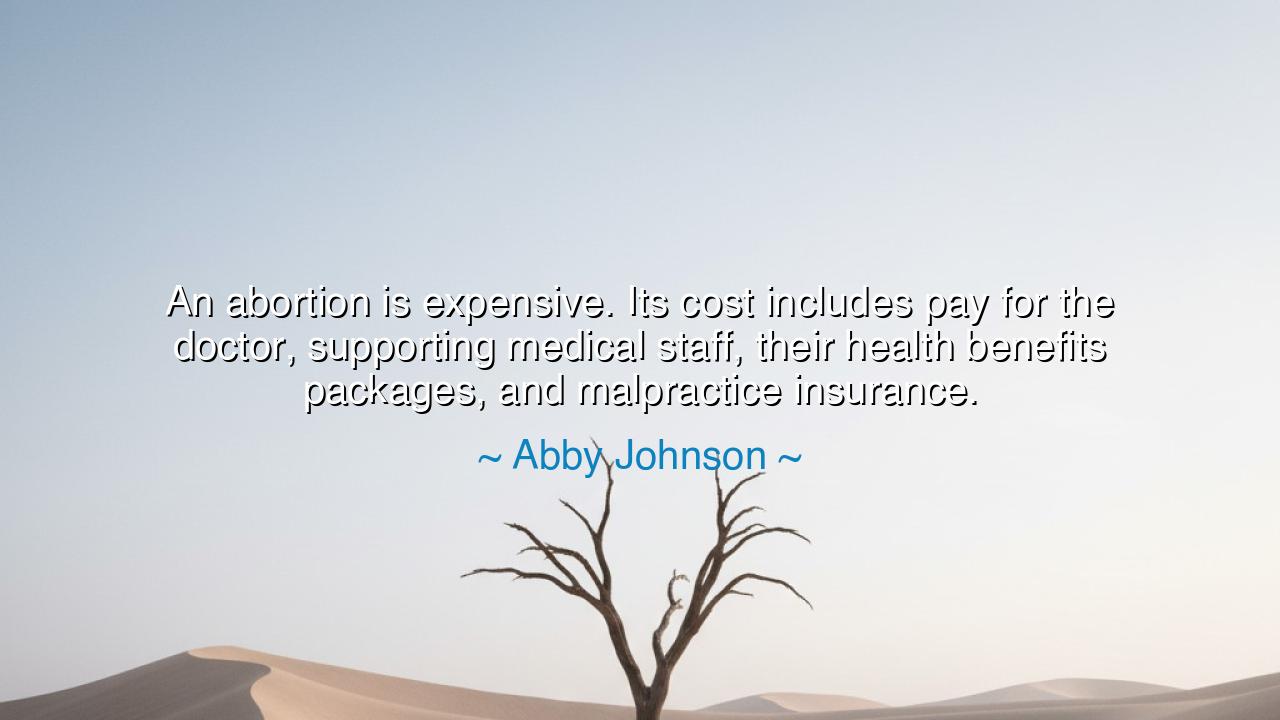
An abortion is expensive. Its cost includes pay for the doctor
An abortion is expensive. Its cost includes pay for the doctor, supporting medical staff, their health benefits packages, and malpractice insurance.






“An abortion is expensive. Its cost includes pay for the doctor, supporting medical staff, their health benefits packages, and malpractice insurance.”
Thus spoke Abby Johnson, a woman who once walked within the walls of the abortion industry and later turned her gaze upon it with new eyes. Her words are not merely an accounting of numbers, but a revelation of hidden cost — a reflection upon how deeply intertwined the practice of medicine, morality, and economics has become in the modern age. Beneath her statement lies a quiet lament: that even the most profound matters of life and death have become subject to the machinery of profit, procedure, and policy.
The origin of this quote emerges from Johnson’s own transformation. Once a director of a Planned Parenthood clinic, she knew intimately the financial and procedural realities of abortion. To her, this was not a distant debate, but a lived experience — she had seen the ledgers, the schedules, the consultations, the bills. What she reveals in this sentence is not simply the monetary cost of an abortion, but the industrial structure that surrounds it. It is a reminder that behind every medical act lies an institution, and behind every institution lies an economy — one that demands compensation for labor, insurance for protection, and benefits for those who serve within it.
Yet there is something deeper in her tone — a trace of moral astonishment. For when she says, “An abortion is expensive,” she is not only speaking of money, but of consequence. Every decision in the realm of medicine carries with it two costs: the one paid in currency, and the one paid in spirit. The ancients would have called this the price of balance, the toll demanded when human hands intervene in the sacred rhythms of life. Abby’s reflection, then, is both practical and philosophical — a recognition that the more society turns life itself into an enterprise, the more it risks forgetting the sanctity that life embodies.
History has long borne witness to this tension between healing and commerce. In ancient Rome, physicians often charged extravagant sums for their services, and yet the philosopher Seneca warned that the greatest doctors were those who healed out of compassion, not for coin. He wrote that “the greedy physician kills the poor,” meaning that when medicine becomes a marketplace, mercy fades. Abby Johnson’s observation echoes this timeless warning. When she lists the costs — the doctor’s fee, the staff, the benefits, the insurance — she paints a picture of a system that has grown intricate, professional, and impersonal. It is efficient, yes, but also distant from the heartbeat of compassion that once defined the art of healing.
Her statement also invites reflection on the moral economics of society — the idea that what is profitable can easily become what is permissible. In her experience, abortion was not simply a matter of choice, but a system sustained by necessity, paperwork, and payment. To sustain such a system, one must justify it not only ethically but financially, until the act itself becomes routine, stripped of awe or sorrow. Here lies the tragedy she exposes: that something so momentous — the ending of potential life — can be rendered as an itemized expense, a procedure among procedures. Her words, therefore, serve as a quiet call to remember what cannot be measured in currency — the human cost, the emotional cost, the cost upon conscience.
There is a parallel in the story of Dr. Ignaz Semmelweis, the 19th-century physician who discovered that handwashing could prevent infection among mothers in childbirth. Though his discovery was revolutionary, it threatened the profits and prestige of his peers, who refused to adopt it. As a result, countless lives were lost. Here, too, we see the collision of ethics and economy — the same conflict Abby Johnson points toward. When the system’s preservation outweighs the sanctity of life, progress falters and humanity suffers.
The lesson in Abby’s words is therefore not confined to one issue; it speaks to all realms where life meets commerce. She warns us to look beyond the visible price and consider the true cost of our actions. Every human choice carries a ledger unseen — one written in the heart. When a society forgets this, when it calculates without conscience, it loses sight of its own soul.
So, my listener, take this teaching to heart: do not let the value of life be reduced to a transaction. Whether in medicine, in politics, or in personal choice, weigh your actions not only by what they cost, but by what they mean. The price of compassion may not appear on any invoice, yet it is the most sacred investment a human can make. Let every healer, every policymaker, every citizen remember — the worth of life cannot be bought, and the true work of humanity is not to count its costs, but to guard its sanctity.






AAdministratorAdministrator
Welcome, honored guests. Please leave a comment, we will respond soon